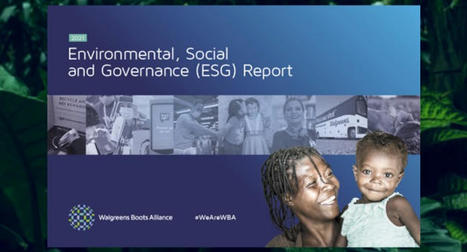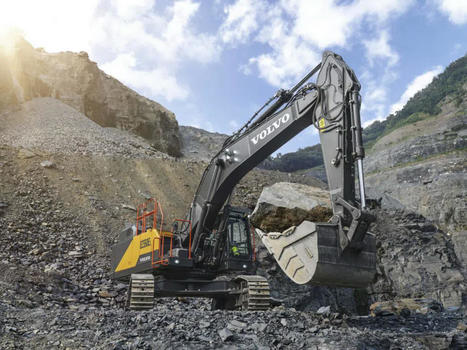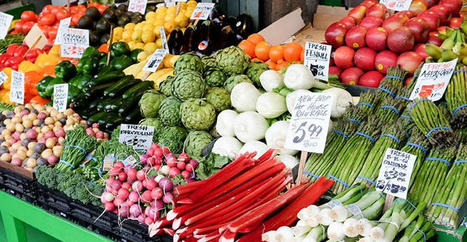 Your new post is loading...
 Your new post is loading...
Online retailer Shein plans to cut emissions across its supply chain by 25% by 2030, the company announced in September.
The targets are among the first public steps to cut carbon emissions for the company, which has become a formidable player in the U.S. fast fashion market. The growth has come with a heavy carbon footprint. Last year, Shein’s operations produced 6.3 million tons of carbon dioxide emissions.
“Today we’re taking a significant step forward, announcing a new set of 2030 goals that will help us accomplish emissions reduction targets for our entire supply chain over the next seven years,” said Adam Whinston, global head of ESG at Shein.
As part of its efforts, Shein set a series of sustainability goals using 2021 data as a benchmark, compiled as a greenhouse gas emissions inventory with the help of certification company Interek. The retailer outlined reduction targets for each emissions level, which includes working with hundreds of suppliers to implement greener practices.
BY THE NUMBERS: SHEIN’S EMISSIONS GOALS
42% - Percent by which Shein aims to reduce its scope 1, owned-operations emissions by 2030
500 - The number of partner facilities Shein and the Apparel Impact Institute will work with to implement energy-savings programs, as part of its scope 3 emissions targets
25% - The percent by which Shein aims to reduce its scope 3 emissions by 2030
Via EcoVadis
Supply chain sustainability is a business strategy implemented by an organization to ensure its supply chain network has a minimum impact on people (human rights, the health and safety of employees) and the planet. In this blog, we’ll focus on the environmental side of supply chain sustainability, which aims to:
- Reduce energy and water consumption
- Generate less waste
- Adapt more energy-efficient systems/processes
- Manage inventory to avoid overstocking
- Reduce logistics-related impacts (emissions) According to the Boston Consulting Group (BCG), global supply chains account for 80% of the planet’s carbon emissions. Of these, more than 90% of the companies in the supply chains are small- to medium-sized enterprises (SMEs).
Via EcoVadis
Walgreens Boots Alliance (WBA) has published its 2021 Environmental, Social and Governance (ESG) Report, which includes the company’s plans for advancing its sustainability agenda.
The company continues to strive to meet its customers’ expectations for responsibly sourced products that contribute to a healthy planet and community wellbeing. For example, WBA committed to reducing its carbon emissions by 30 percent by 2030 compared with 2019.
Packaging is also a large part of WBA’s sustainability agenda.
Via EcoVadis
Strong financial outcomes and sustainability focused leadership is required for long term impact, according to a new report from IDC.
In the document, IDC FutureScape: Worldwide Sustainability 2022 Predictions - APEJ Implications, IDC has identified the top 10 predictions for environmental, social, and (corporate) governance (ESG) in 2022 and beyond.
The report provides organisations with context and underlying drivers for IT investments supporting ESG initiatives for the predictions.
According to IDC, the last two years have seen significant debate and mixed results in the area of climate change. The world has experienced a brief reprieve in emissions due to lockdowns in early 2020. However, emissions increased beyond pre-pandemic levels in 2021.
The UN Climate Change Conference (COP26) has amplified the climate change plan. Even so, critics question whether the agreements articulated are enough.
In the Asia/Pacific region, the drivers that result in concrete sustainability outcomes are still primarily financial, the analysts state.
Via EcoVadis
Honeywell, an American conglomerate specializing in various industries, including manufacturing. It has recently committed to reaching carbon neutrality by 2035 and plans on achieving this goal through investments in energy-saving projects, a transition to renewable power sources and other similar initiatives.
The U.S.-based company’s sustainability goals have been at the forefront of its operations since 2004, and since 2010, it has taken on over 5,700 sustainable projects and saved $100 million per year.
Another notable company is Henkel, is a leader in the household and personal care manufacturing market. It has a comprehensive sustainability strategy that’s been the focus of its operations for 140 years. The company believes eco-friendliness and business success go hand in hand.
Henkel releases its sustainability report annually, showing goals it’s reached or is striving to. The organization ranked among the “2021 Global 100 Most Sustainable Corporations in the World,” a notable achievement that only a few organizations receive.
Then there is Ørsted, a multinational power company located in Denmark, which has made noteworthy progress in achieving its sustainability goals. The world’s most sustainable company for three years running, Ørsted says it is committed to fighting climate change, transitioning to renewable energy and decarbonizing the global supply chain. Ørsted has earned 62.2% of its revenue from renewable energy, reduced carbon emissions by 47% and spent millions of dollars in green investments.
Via EcoVadis
On July 14th the European Commission published a new set of climate change proposals aimed at bringing the bloc closer to its 2030 goal to reduce emissions by 55% (from its 1990 levels) and eventually become completely climate neutral by 2050.
The far reaching proposals cover a number of areas, expanding on past commitments and also introducing a new carbon tariff on materials such as steel, aluminium, and concrete coming from abroad. Some changes include:
- Stricter emission limits on cars, with the aim to end all petrol and diesel vehicle sales by 2035
- A revision of the EU Emissions Trading System (EU ETS) to reduce greenhouse gas emissions from the power sector, industry, and flights, including a tax on aviation fuel
- More ambitious targets for expanding renewable energy, including a tax holiday for low-carbon alternatives
- New national targets for sectors outside emissions trading, such as transport, buildings and agriculture
Via EcoVadis
|
Heavy equipment users have a new tool from Volvo Construction Equipment to help with carbon reduction goals tailored to their operations.
The CO2 Reduction Program is designed to be integrated into an organization’s operational plans and offers insights, analysis, improvement possibilities and sustainability targets while working toward carbon neutrality. The approach will be designed specifically to each user’s goals and operations.
The program will start by analyzing where an organization stands on its carbon emissions to establish a baseline for making improvements. It will use data from connected machines to determine the carbon footprint for all machines, regardless of brand, that are in use. Volvo CE says this will help users visualize the impact of carbon reduction changes over time.
Via EcoVadis
A carbon footprint measures the number of greenhouse gases produced in a human's day-to-day activities. Therefore, reducing it improves the sustainability of the environment to a great extent, while increasing it has opposite effects. Sustainability greatly affects all sectors, including the banking sector. Banks are now adopting sustainability principles that will change the financial sector and its future long-term strategy.
Net zero emission refers to the efforts of eliminating all man-made greenhouse gases from the Earth's atmosphere, to reduce its net climate balance. The banking sector has adopted these reduction techniques in an attempt to curb carbon emissions from their operations, and from companies they have financed. Furthermore, many others have joined the financial sector in pledging net zero emissions by 2050.
Via EcoVadis
As sustainable business practices become more and more important to consumers, and as big corporations proclaim their commitment to sustainability, independent natural retailers point out that they've been leading in this area all along.
Their tendency to focus on organic products, local sourcing and minimizing waste has been core to their business strategies for decades, and they have often built customer followings based on those principles.
"We have held these values near and dear for 29 years," said Steven Rosenberg, founder and chief eating officer, Liberty Heights Fresh in Salt Lake City. "This isn't anything new to us. We feel we should all do our best to use less of the Earth's resources, whether it be water, clean air, healthy soil, less electricity, and certainly less carbon-emitting energy."
Likewise, Eli Lesser-Goldsmith, CEO of Healthy Living Market & Café in South Burlington, Vt., said his company prides itself on its nearly four decades of environmentally conscious positioning.
Via EcoVadis
While real estate owners large and small have offered bold promises about reducing carbon emissions, diversifying boards and other initiatives, it is only recently that many of them have begun to share details on just how they plan to achieve those goals. Only now are we beginning to see both concrete plans to reach these often lofty objectives, as well as the methods of reporting they will use to measure their progress. These early returns show there is much to be encouraged about, while also leaving considerable room for concern about whether these measures, focused almost entirely at the property level, will ever have meaningful impact beyond the sum of their various parts.
Via EcoVadis
With corporate social responsibility (CSR) seeing the largest increase of any CPO priority between 2019 and 2021 (Deloitte 2021) and more than half of FTSE100 companies committing to carbon neutrality in 2021 (Ecoact 2021), it doesn’t need to be sold that sustainability in procurement is no longer a "nice to have" feature.
Some of the key reasons why companies are increasing their sustainability focus are reaching set targets, complying with customer and other stakeholder demands, improving supply chain transparency, and mitigating environmental impact, particularly emissions.
Via EcoVadis
|



 Your new post is loading...
Your new post is loading...















